

Whither MOOCs? Universal access to high-quality college courses at low cost for students anywhere with an Internet connection continues to make Massive Online Open Courses (MOOCs) the innovation that will, in the minds of its advocates, “revolutionize” or to use the favorite word of entrepreneurs, “disrupt” higher education.
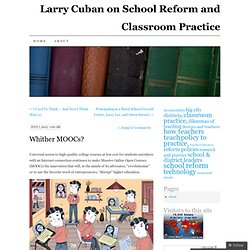
Deep and abiding issues, however, prevent MOOCs from revolutionizing higher education. One issue is money. States have reduced funding for public higher education institutions. Universities have lowered labor costs by increasing adjunct and part-time faculty yet have raised tuition so that students face prices for going to college that far outstrip increases in wages and the cost of living. So how can MOOCs be converted into a revenue stream for money-strapped institutions?
Of course, mortality rates run high in new industries as consolidation and new technologies come and go. Why will some of these MOOC start-ups die? Economists call this the “cost disease.”
Google Launches Free Tool To Let You Run Your Own Online Courses. Sensing the excitement from online education tools like edX , Google has just unveiled a (very beta) version of its own course building software. If you’ve ever wanted to run your own online courses, this might be worth your time. Google’s new Course Builder software comes on the heels of a massively popular online Google class ‘ Power Searching With Google ‘ hosted by Google’s Director of Research, Peter Norvig.
Click here to get started with Google’s new Course Builder Why They Did It Norvig shared a bit more information about the impetus for creating the online course and the power searching course, saying it “was a strong success and also generated some technology that we thought would be useful to share with the world,” says Norvig. It’s interesting that Google is trying to do something completely new rather than help build edX or an already established tool. Google+ Hangouts Coming Soon. Storming the castle: free courses & college credit. Although the sound of the assault is barely perceptible through the thick walls of academia, the besiegers are steady and tireless as ants.
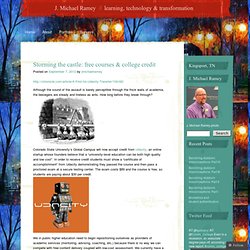
How long before they break through? Colorado State University’s Global Campus will now accept credit from Udacity, an online startup whose founders believe that a “university-level education can be both high quality and low cost”. In order to receive credit students must show a “certificate of accomplishment” from Udacity demonstrating they passed the course and then pass a proctored exam at a secure testing center.
The exam costs $89 and the course is free, so students are paying about $30 per credit. We in public higher education need to begin repositioning ourselves as providers of academic services (mentoring, advising, coaching, etc.) because there is no way we can compete with free content delivery coupled with low-cost assessment. California and the Right to Educational Access. We are pleased to announce the publication of our white paper on California’s bottleneck course issue.
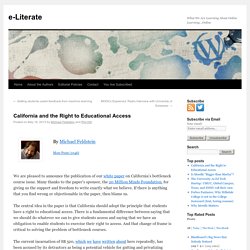
Many thanks to the paper’s sponsor, the 20 Million Minds Foundation, for giving us the support and freedom to write exactly what we believe. If there is anything that you find wrong or objectionable in the paper, then blame us. The central idea in the paper is that California should adopt the principle that students have a right to educational access. There is a fundamental difference between saying that we should do whatever we can to give students access and saying that we have an obligation to enable students to exercise their right to access. And that change of frame is critical to solving the problem of bottleneck courses. The current incarnation of SB 520, which we have written about here repeatedly, has been accused by its detractors as being a potential vehicle for gutting and privatizing California’s public higher education.
You can read the white paper here. Saylor Foundation's Free Courses Offer Path to Credit. The Saylor Foundation has nearly finished creating a full suite of free, online courses in a dozen popular undergraduate majors.
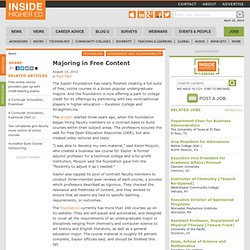
And the foundation is now offering a path to college credit for its offerings by partnering with two nontraditional players in higher education – Excelsior College and StraighterLine. The project started three years ago, when the foundation began hiring faculty members on a contract basis to build courses within their subject areas. Find OpenCourseWare with OCW Search. OCW Consortium. Free Online Course Materials. 27 places to get a free science education. Click to tweet this page Carnegie Mellon University is just one of the organizations offering course material for free.
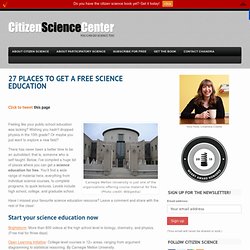
(Photo credit: Wikipedia) The American Revolution. Professor Joanne Freeman, Professor of History Description The American Revolution entailed some remarkable transformations--converting British colonists into American revolutionaries, and a cluster of colonies into a confederation of states with a common cause--but it was far more complex and enduring than the fighting of a war.
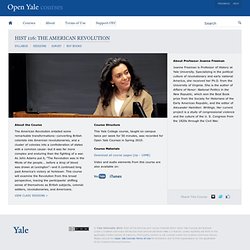
As John Adams put it, "The Revolution was in the Minds of the people... before a drop of blood was drawn at Lexington"--and it continued long past America's victory at Yorktown. This course will examine the Revolution from this broad perspective, tracing the participants' shifting sense of themselves as British subjects, colonial settlers, revolutionaries, and Americans. Texts Bailyn, Bernard. Brown, Richard D., ed. Cray, Robert E. Gross, Robert A. Hamilton, Alexander, James Madison, and John Jay. McDonnell, Michael.